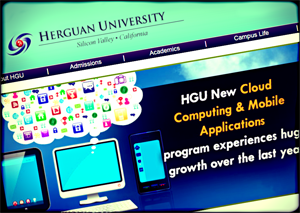Should the president of a university authorized by the Department of Homeland Security to accept foreign students in the United States be fluent enough in English to appear in a federal criminal court without an interpreter? You would think so.
Most U.S. university presidents are fluent in English.
Most university presidents are not charged with fraud in a federal court.
Most university presidents are high-ranked employees of their universities, not also the owners thereof.
Most university presidents do not run visa mills.
And then there's Jerry Wang, the owner and president of Herguan University in Silicon Valley's Sunnyvale, who does not fit any of those four generalizations.

ICE has raided his operation and the Justice Department has indicted him for visa fraud, as we reported in an earlier CIS Memorandum, "Visa Mills, Diploma Mills and Other For-Profit Colleges".
A court paper shows that when he was brought before Federal Magistrate Judge Howard R. Lloyd in the Northern District of California on August 22 for a preliminary hearing there was a Mandarin-speaking interpreter present, Chen-Hao Hsu, presumably because someone figured that would be helpful. Users of PACER, the federal courts' electronic data system, can read that document at case 5:12-cr-00581-EJD, document 8, and his indictment at the same case number, document 1.
Subsequently Wang dropped the interpreter and had his lawyer sue the U.S. government in an effort to thwart ICE's threat to suspend his institution's ability to issue the I-20 form which sets in motion the granting of F-1 visas.
Both the criminal and the civil cases are still pending, with a federal judge ruling against a temporary restraining order in the civil matter twice in one week. But while the courts have been sturdy, ICE has been flaccid.
On August 4, ICE issued a notice of intent to withdraw the university's right to issue the I-20, and gave Herguan 30 days to respond; on September 18, hearing nothing from the university's lawyers, it revoked the privilege, only to reverse itself the next day.
Why, I asked an ICE publicist, did that happen?
"Well, the lawyers did, in fact, respond to us," she said, "but they sent it to the wrong address so while we are considering the evidence, we have restored their authority to issue the I-20."
In short, the university's power to run what the feds think is a visa mill has been restored, at least momentarily, because of their lawyers' incompetence!
The university's website, sees it differently; its message to its students (and maybe that should be "students") says cheerfully, and misleadingly: "SEVP has accepted our response to their notice and reinstated your I-20s."
SEVP is the Student Exchange Visitor Program, the part of ICE that deals with foreign students.
The lackluster response of SEVP and ICE to the problem of visa mills was the subject of a Senate committee hearing last month, as covered in an earlier blog.
